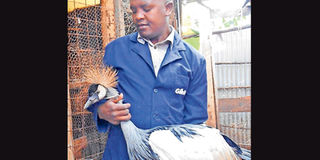Keeping dogs, cats and other predators away from birds

Peter Kunyonya with one of the ornamental birds he keeps in his farm in Utawala, Nairobi. He started the venture in 2010. PHOTO | COURTESY
What you need to know:
- Kunyonya built a fence around his compound. He also constructed an “underground” fence to prevent burrowing predators like rats that eat chicks and eggs.
- Kunyonya cleared the bushes and tall grass around the compound “which were perfect hideouts for dogs, cats and rats”.
- Leftover food attracts predators, so he made sure the cages were cleaned every evening. He was also advised to buy guard dogs.
- The farmer does regular checks on the coop for holes and gaps, which are quickly repaired.
Nyika Birds and Dairy Goats Farm is located on a quarter-acre farm in Utawala, Nairobi County.
Mr Peter Kunyonya, the owner, chose to break away from convention by keeping ornamental and exotic birds.
The birds are characterised by their colourful feathers. Kunyonya started the venture in 2010. Back then, he also owned a mini supermarket but farming was more convenient as he could work from home.
“I started out with only six chickens that cost around Sh3,600. With time, my home was full of birds and eggs,” he says.
The chickens fed on leftover food from the supermarket and a hotel. He later sold the chickens and bought ducks, turkeys, guinea fowls and quails. Kunyonya later discovered that he could keep other birds.
“I went for ornamental birds because almost everyone in Kenya keeps hens and the market, especially for eggs, has has gone down,” he says.
Tragedy struck in 2014 when he found all his birds dead one morning. They had been attacked by cats and dogs.
The incident was an eye-opener that led him to invest in the security of his birds.
Kunyonya built a fence around his compound. He also constructed an “underground” fence to prevent burrowing predators like rats that eat chicks and eggs.
He buried a hardware mesh two feet around the compound. He also covered the birds’ coop with a chicken mesh to keep away hawks and owls.
CLEARED BUSHES AND TALL GRASS
Kunyonya cleared the bushes and tall grass around the compound “which were perfect hideouts for dogs, cats and rats”.
He started locking the cages to protect the birds from thieves. He first bought the locks and repaired doors. He then bought even stronger locks for the main entrance to the birds’ coop.
Leftover food attracts predators, so he made sure the cages were cleaned every evening. He was also advised to buy guard dogs.
“They alert me of any predator. But you have to feed your dogs properly lest they turn into predators,” he says.
He advises anyone interested in keeping birds to ensure chemicals like pesticides are kept safely away.
“Birds eat almost anything. Ingesting pesticides can lead to mass deaths,” he says.
The farmer does regular checks on the coop for holes and gaps, which are quickly repaired.
Kunyonya emphasises on cleanliness. The birds’ feeders should be cleaned regularly to prevent diseases.
“The birds should also be given fresh feeds and clean water. The cages should be cleaned regularly,” he says.
Investing in an electric fence helps keep predators away.
Kunyonya says he has not installed such a fence but is planning to do so very soon. Such a fence also prevents thieves from getting into the farm.




